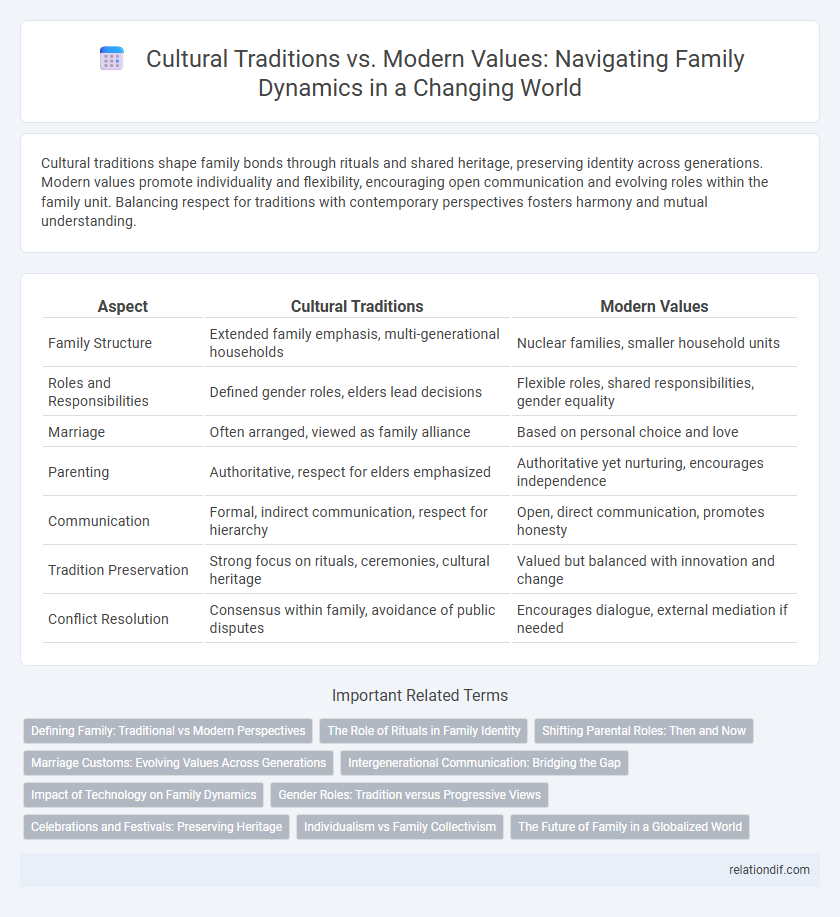Cultural traditions shape family bonds through rituals and shared heritage, preserving identity across generations. Modern values promote individuality and flexibility, encouraging open communication and evolving roles within the family unit. Balancing respect for traditions with contemporary perspectives fosters harmony and mutual understanding.
Table of Comparison
| Aspect | Cultural Traditions | Modern Values |
|---|---|---|
| Family Structure | Extended family emphasis, multi-generational households | Nuclear families, smaller household units |
| Roles and Responsibilities | Defined gender roles, elders lead decisions | Flexible roles, shared responsibilities, gender equality |
| Marriage | Often arranged, viewed as family alliance | Based on personal choice and love |
| Parenting | Authoritative, respect for elders emphasized | Authoritative yet nurturing, encourages independence |
| Communication | Formal, indirect communication, respect for hierarchy | Open, direct communication, promotes honesty |
| Tradition Preservation | Strong focus on rituals, ceremonies, cultural heritage | Valued but balanced with innovation and change |
| Conflict Resolution | Consensus within family, avoidance of public disputes | Encourages dialogue, external mediation if needed |
Defining Family: Traditional vs Modern Perspectives
Traditional perspectives define family through blood relations and hierarchical roles emphasizing stability and continuity, while modern views embrace diverse structures, including single-parent and blended families, prioritizing emotional bonds and individual choice. Cultural traditions often uphold rituals and gender roles that reinforce family identity, whereas modern values challenge these norms by promoting equality and adaptability. This evolving definition of family reflects broader societal shifts toward inclusivity and personalized connections.
The Role of Rituals in Family Identity
Rituals play a crucial role in reinforcing family identity by preserving cultural traditions that connect generations and provide a shared sense of belonging. These practices, from holiday celebrations to daily routines, serve as tangible expressions of family values that anchor members amid changing societal norms. Maintaining such rituals supports emotional bonds and fosters resilience, even as modern values introduce new perspectives within the family dynamic.
Shifting Parental Roles: Then and Now
Parental roles have significantly evolved from traditional cultural expectations, where fathers were primarily breadwinners and mothers caregivers, to a more balanced partnership embracing shared responsibilities in child-rearing and household duties. Modern values emphasize emotional involvement, active communication, and flexibility, reflecting broader societal changes in gender equality and work-life balance. This shift fosters healthier family dynamics, promoting mutual support and stronger bonds between parents and children.
Marriage Customs: Evolving Values Across Generations
Marriage customs reflect evolving values as traditional ceremonies rooted in cultural heritage increasingly blend with modern ideals emphasizing individual choice and gender equality. Generational shifts reveal a transition from arranged marriages and rigid rituals to partnerships founded on mutual respect and personal compatibility. This evolution highlights the dynamic interplay between preserving cultural identity and adapting to contemporary social norms within family structures.
Intergenerational Communication: Bridging the Gap
Intergenerational communication within families often reflects the tension between cultural traditions and modern values, creating challenges in understanding and acceptance. Emphasizing active listening, empathy, and shared experiences helps bridge generational divides by fostering mutual respect and open dialogue. Family members who engage in honest conversations about values and beliefs promote unity and preserve cultural heritage while embracing contemporary perspectives.
Impact of Technology on Family Dynamics
Technology has transformed family dynamics by altering communication patterns and reshaping daily routines, often bridging geographic distances while sometimes reducing face-to-face interactions. Digital devices and social media platforms influence parenting styles and sibling relationships, introducing both opportunities for connection and challenges related to screen time and privacy. This technological shift necessitates a balance between preserving cultural traditions and adapting to modern values within family structures.
Gender Roles: Tradition versus Progressive Views
Traditional family structures often emphasize clearly defined gender roles, with men as primary breadwinners and women as homemakers, reflecting long-standing cultural customs. Modern values promote gender equality, encouraging shared responsibilities and the dismantling of stereotypical roles within households to foster inclusivity and individual choice. This ongoing shift influences parenting styles, career opportunities, and domestic dynamics, reshaping family interactions in contemporary society.
Celebrations and Festivals: Preserving Heritage
Celebrations and festivals play a crucial role in preserving cultural heritage within families by passing down traditional customs, rituals, and stories from generation to generation. Modern values often influence the way these events are observed, incorporating contemporary elements while maintaining core cultural significance. This blend of tradition and modernity strengthens family bonds and fosters a deeper understanding of cultural identity among younger members.
Individualism vs Family Collectivism
Cultural traditions emphasize family collectivism, prioritizing group harmony, shared responsibilities, and interdependence among family members. Modern values often promote individualism, encouraging personal autonomy, self-expression, and independence within family dynamics. Balancing these perspectives involves respecting collective family obligations while supporting individual growth and decision-making.
The Future of Family in a Globalized World
Cultural traditions shape family structures by preserving heritage and social roles, while modern values emphasize individual autonomy and gender equality. The future of family in a globalized world involves blending these elements, fostering diverse and adaptive family models that reflect both collective history and contemporary lifestyles. Cross-cultural exchanges and technological advancements accelerate this evolution, creating resilient families that balance tradition with innovation.
Cultural traditions vs Modern values Infographic

 relationdif.com
relationdif.com